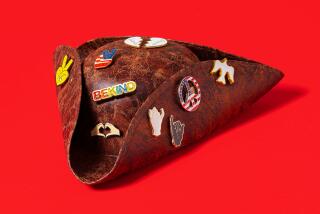The Pulse of Patriotism
- Share via
SAN FRANCISCO — In peace time, America is the most original nation in the world. We are the maddest, most inventive; truly a splendid disorder are we. When America goes to war, we become a nation like any other.
Nowadays, I turn on TV and hear Americans gamely stumbling through the national anthem. At an intersection yesterday, I saw a Lexus carrying a socialite alongside a pickup with a kid who was absorbing the thump-thump-thump of rap music--both cars wearing the stars and stripes.
Everywhere I walk in San Francisco, in shop windows, signs of uniform size, identical lettering, proclaim: UNITED WE STAND.
Odd. I had always assumed the reverse: That the strength of America derives from our variety and disparate opinions. Which is to say: DISUNITED WE STAND.
In today’s nation of wartime unity, television comedians, newspaper columnists, Berkeley politicians and everyday loonies--indeed, anyone who might voice an eccentric opinion about Sept. 11 and our government’s response--have been called down by their fellow Americans as unpatriotic.
Immediately after Sept. 11, I found it dismaying that opinion turned so uniform. And it was not until I began to hear dissenting voices--opinions I didn’t necessarily share--that I knew the America I recognized had survived.
Meanwhile, from his cave emerges Osama bin Laden, a medieval villain, fondling a microphone, to describe the United States as a “Jewish-Christian alliance.”
America, of course, is no such thing. America is the Enlightenment’s daughter, a nation that someone like Bin Laden cannot comprehend. America was created as a secular country. Which is why, today, Buddhist, pagan, Methodist and Hindu live side by side.
In my opinion, President Bush was not only shrewd but authentically patriotic in his insistence that Muslims should be regarded by their neighbors as true Americans. Treating Muslims as Americans at this moment of history is not magnanimous, but an act essential to our nation’s meaning.
My Mexican immigrant father, I remember, was never less than grateful for the economic freedom of America; never wasted a moment of nostalgia for the country he had left behind. But my father was confused by the variety of America.
“There is no unity here; this is not a real country,” my father used to remark. Coming from a Mexican village of continuity, my father found metropolitan America a puzzle.
But from the first, I was seduced by America, enchanted by the idea that a nation could be organized, disorganized, around the first-person, singular pronoun.
The history of America I read was the history of a young country extending, too slowly and painfully at times, but certainly extending the definition of “the American,” decade after decade. It was a marvel to me and the source of my greatest love of this country--the way the country enlarged with every facet, every religion and race and tongue and recipe. America became the jewel of civilization.
Wartime is not the best time to see this America. In wartime, Americans are merely united; the country defines itself by what it must exclude and resist.
When I was a boy in the 1950s, I remember hearing adults talk nostalgically about the way the country had been united a decade earlier. Americans in World War II had been galvanized by a sense of a shared enemy, a common purpose. “You wouldn’t believe it,” a neighbor lady said to me.
But in the peacetime America of the 1950s, America was drawing new worlds to itself--drawing my Mexican family to itself, even while the country was finding its meaning in its disunion.
By the late 1950s, rock ‘n’ roll jackhammered a channel we named the “generation gap.” And Americans of every age sped along newly constructed interstates, trying to get as far as possible from in-laws and the inner city. And my neighbor lady was getting a divorce.
I sing the American parade in peacetime: the Chinese teenager with earphones; the Russian woman in a sparkling sweater; the blue-suited Big Deal chattering into her cell phone; the tattoos and the shorts; the big bellies; the prim; the rabbinical; the anarchic.
It is true that the chaos of America can leave us melancholic and lonely. The pace and frenzied desires of our lives often leave us, more than any other people on Earth, addicted to sexual titillation, celebrity (the glamour of the oversized ego) and drugs, “recreational” and not.
There are days, I admit, when the fury of America--the determination of each driver to pull ahead--seems a madness and leaves me feeling that America is the thinnest culture in the world, barely a “nation.”
But from the American respect for individualism would also come our nation’s great originality and creativity. American culture is the mass culture of the world, because the world is hungry for an idea of itself larger than a single creed, nation or color.
This is, of course, why the religious fundamentalist, the nationalist and the tribalist must hate America.
It is nothing for me to hate in return. Indeed, I loathe Bin Laden--may his tribe decrease. I resent him most because he has taken away my America at peace, at frenzy, and has replaced it with a nation of uniform opinion and too little sense of its greatness.
I cannot imagine a more patriotic insult America could offer Bin Laden than to become as divided in wartime as we are divided in peace.
More to Read
Get the L.A. Times Politics newsletter
Deeply reported insights into legislation, politics and policy from Sacramento, Washington and beyond. In your inbox three times per week.
You may occasionally receive promotional content from the Los Angeles Times.










